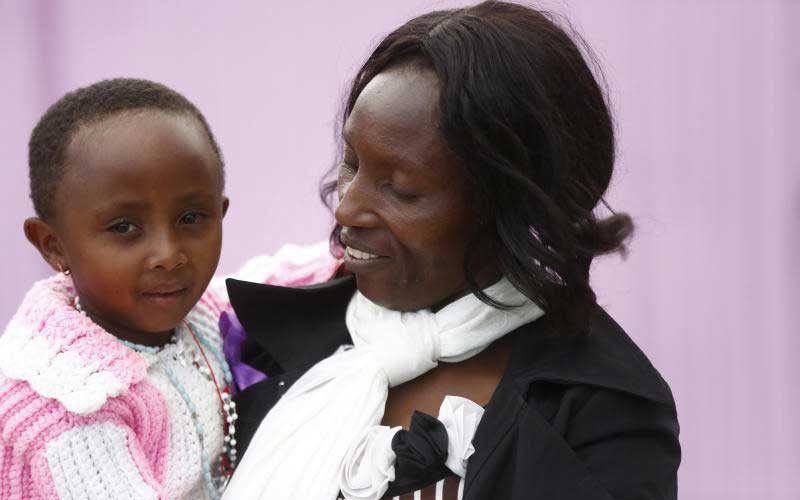
She is cheerful as she runs up and down playing at the Palliative Care Unit at the Naivasha Hospital. Today, the four-year-old is undergoing a therapeutic session, meant to relieve her from the pain that comes with cancer disease.
Meet Olive Waruguru, the youngest cancer survivor at the hospital. Little Waruguru is suffering from kidney cancer (nephroblastoma), a disease she was diagnosed with at three years.
The last born in a family of four had her right kidney removed and she has since undergone 21 chemotherapy and 11 radiotherapy sessions.
Her mother, Margaret Wambui, shares her daughter’s journey.
“How would my daughter contract cancer at such a tender age? I feel the pain she suffers,” she says.
Narrating her diagnostic journey and treatment, Ms Wambui says though she was born healthy, her daughter developed pneumonia at two weeks, leading to her admission at the same hospital.
Further, she was placed on ulcers treatment according to medical records, but her condition continued to deteriorate.
At three years, Waruguru was re-admitted at the facility and was further referred to Kijabe Mission Hospital for specialised care.
By then, she presented symptoms of fever, vomiting, blood in urine, constipation and difficulty in breathing.
Kidney complications
She was found to have kidney complications. The patient was taken to Kenyatta National Hospital, and it is here that doctors diagnosed her with cancer of the kidney. Her right kidney was removed, and she was placed on chemo and radiotherapy sessions.
News that her child had cancer caught Wambui off guard.
“News that my daughter was suffering from cancer at such a tender age took a toll on my family,” says Wambui.
The mother had to undergo counseling to enable her understand the management of the disease in order to take care of her girl, who has lost a lot of weight.
“Chemotherapy sessions have weakened my daughter’s immune system, an issue that has delayed her enrolment in school,” says the mother.
Waruguru is unaware that she suffers from a life threatening disease, but knows that her tummy was operated on.
“I love drawing pictures here. This is after doctors cut my tummy, though I do not know why,” she says.
According to Mary Gacheru, a palliative nurse at Naivasha Hospital, palliative care relieves one’s pain associated to cancer. “Palliative care is provided in a holistic manner by involving all family members. It is through such care that the girl’s family gets to understand how to help her manage the condition and with time, she will understand what cancer is,” she says. At the same time, Wambui participates in hospital activities that help raise money.
“Cancer is expensive to treat, this is why we encourage families with cancer patients to join palliative unit where they can knit clothes and involve themselves in economic activities to afford drugs,” says Ms Gacheru.
Paediatric nephrologist at Aga Khan University Hospital and Gertrude Children Hospital Doris Wanjiru Kinuthia says nephroblastoma is a common childhood tumour that occurs in children between one to five years. “Nephroblastoma is caused by immature cells in the kidney; cells are supposed to differentiate themselves into various aspects of the genital urinary system, but some become cancerous,” says Dr Kinuthia. If detected and treated early, one can be cured of the disease, and at least 80 to 90 per cent of patients in the west survive it.
Dr Kinuthia says nephroblastoma has four stages: stage one is at kidney level, while stage four is advanced, and can spread to the other kidney.
She adds, “The cancer can advance to stage four if not treated early, it goes to the liver, lungs and mortality rate is very high.”
Different types
Prof Jessie Githang’a of the haematology and blood transfusion unit, Department of Human Pathology, University of Nairobi, says there are at least 120 to 130 children admitted with different types of cancers at KHN, kidney cancer being the fourth common one.
Treatment of the disease is multidisciplinary, and involves paediatric cancer specialists, oncology nurses, counselors, physiotherapists and oncology pharmacists.
“Treatment of nephroblastoma needs surgical, radiotherapy and supportive care,” says Prof Githang’a.
During treatment, she says, experts look at the age of a patient, nutritional data, stage of the disease and response to chemotherapy, because some do not respond as expected.
“Chemotherapy entails use of strong drugs, causes loss of appetite and hence weight, nausea and vomiting. This is why counseling is vital,” she says.
She adds that cancer in children has always been there, but there has been lack of awareness. A number of children have cancer but people think they are simply unwell.
According to the Ministry of Health, over 3,200 children with cancer have been reviewed in the country this year, and those with kidney tumours are 208.
 The Standard Group Plc is a multi-media organization with investments in media
platforms spanning newspaper print
operations, television, radio broadcasting, digital and online services. The
Standard Group is recognized as a
leading multi-media house in Kenya with a key influence in matters of national
and international interest.
The Standard Group Plc is a multi-media organization with investments in media
platforms spanning newspaper print
operations, television, radio broadcasting, digital and online services. The
Standard Group is recognized as a
leading multi-media house in Kenya with a key influence in matters of national
and international interest.











